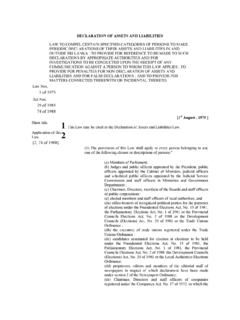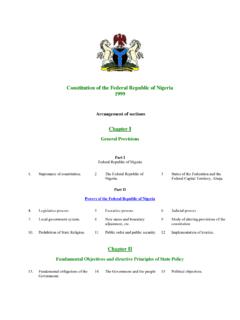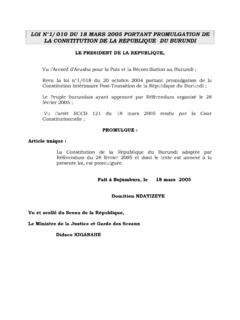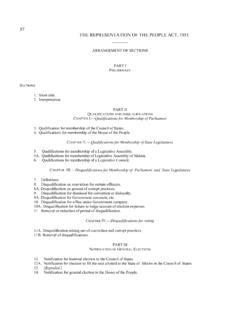Transcription of LAW OF THE REPUBLIC OF INDONESIA NUMBER 31, YEAR …
1 LAW OF THE REPUBLIC OF INDONESIA . NUMBER 31, YEAR 1999 . REGARDING eradication OF CRIMINAL ACTS OF corruption . WITH THE GRACE OF GOD THE ALMIGHTY. THE PRESIDENT OF THE REPUBLIC OF INDONESIA . Considering: a. corruption is detrimental to the finances of the state or the economy of the state and inhibits national development, hence it must be eradicated in the context of creating an equitable and prosperous society based on Pancasila and the 1945 Constitution;. b. The consequences of recent corruption , in addition to being detrimental to the finances of the state or the economy of the state, also inhibit growth and the sustainability of national development which demand the highest of efficiency;. c. Law No. 3/1971 regarding the eradication of Criminal Acts of corruption is no longer applicable in light of developments in the legal needs of society. Therefore it must be replaced with a new law regarding the eradication of Criminal Acts of corruption and is hence expected to be more effective in preventing and eradicating corruption .
2 D. Based on the considerations as referred to in letters a, b, and c, a new law regarding the eradication of Criminal Acts of corruption shall be required. In view of: 1. Article 5 paragraph (1) and Article 20 paragraph (1) of the 1945. Constitution: 2. The Stipulation of the People's Consultative Assembly No. XI/MPR/1998 regarding a Clean and corruption -free, Collusion-free and Nepotism-free State Administrator;. With the approval of THE PEOPLE'S CONSULTATIVE ASSEMBLY OF THE REPUBLIC OF INDONESIA . HAS DECIDED: To stipulate: LAW REGARDING THE eradication OF CRIMINAL ACTS OF. corruption . CHAPTER I. GENERAL PROVISIONS. Article 1. Referred to in this law as: 1. A corporation shall be an organized group of persons and/or assets both as legal entities as well as non-legal entities. 2. Civil Servants shall comprise: a. Civil servants as referred to in the Law Regarding Employment.
3 B. Civil servants as referred to in the Criminal Code;. c. Persons receiving salaries or wages from the state or regional treasury;. d. Persons receiving salaries or wages from a corporation receiving assistance from state or regional treasury;. e. Persons receiving salaries or wages from other corporations using capital or facilities of the state or the public. 3. Every person shall be considered an individual or a member of a corporation. CHAPTER II. CRIMINAL ACTS OF corruption . Article 2. (1) Anyone unlawfully enriching himself and/or other persons or a corporation in such a way as to be detrimental to the finances of the state or the economy of the state shall be liable to life in prison, or a prison term of not less than 4 (four) years and not exceeding 20. (twenty) years and a fine of not less than Rp 200,000,000 (two hundred million rupiah) and not exceeding Rp 1,000,000,000 (one billion rupiah).
4 (2) In the event that corruption as referred to in paragraph (1) is committed under certain circumstances, capital punishment may be applied. Article 3. Anyone with the intention of enriching himself or other persons or a corporation, abusing the authority, the facilities or other means at their disposal due to rank or position in such a way that is detrimental to the finances of the state or the economy of the state, shall be liable to life imprisonment or a prison term of not less than 1 (one) year and not exceeding 20 (twenty) years and/or a fine of not less than Rp 50,000,000 (fifty million rupiah) and not exceeding Rp 1,000,000,000 (one billion rupiah). Article 4. Compensation for losses inflicted upon the finances of the state or the economy of the state shall not annul the punishment of the perpetrator of a criminal act of corruption as referred to in Article 2 and Article 3.
5 Article 5. Any person committing a crime as referred to in Article 209 of the Criminal Code shall be liable to a prison term of not less than 1. (one) year and not exceeding 5 (five) years and/or a fine of not less than Rp 50,000,000 (fifty million rupiah) and not exceeding Rp 250,000,000 (two hundred and fifty million rupiah). Article 6. Any person committing the criminal acts as referred to in Article 210. of the Criminal Code shall be liable to a prison sentence of not less than 3 (three) years and not exceeding 15 (fifteen) years and a fine of not less than Rp 150,000,000 (one hundred and fifty million rupiah). and not exceeding Rp 750,000,000 (seven hundred and fifty million rupiah). Article 7. Any person committing the criminal acts referred to in Article 387 or Article 388 of the Criminal Code shall be liable to a prison term of not less than 2 (two) years and not exceeding 7 (seven) years and/or a fine of not less than Rp 100,000,000 (one hundred million rupiah) and not exceeding Rp 350,000,000 (three hundred and fifty million rupiah).
6 Article 8. Any person committing the criminal acts referred to in Article 415 of the Criminal Code shall be liable to a prison term of not less than 3. (three) years and not exceeding 15 (fifteen) years and a fine of not less than 150,000,000 (one hundred and fifty million rupiah) and not exceeding Rp 750,000,000 (seven hundred and fifty million rupiah). Article 9. Any person committing the criminal acts as referred to in Article 416. of the Criminal Code shall be liable to a prison term of not less than 1 (one) year and not exceeding 5 (five) years and a fine of not less than Rp 50,000,000 (fifty million rupiah) and not exceeding Rp 250,000,000 (two hundred and fifty million rupiah). Article 10. Any person committing the criminal acts as referred to in Article 417. of the Criminal Code shall be liable to a prison term of not less than 2 (two) years and not exceeding 7 (seven) years and a fine of not less than Rp 100,000,000 (one hundred million rupiah) and not exceeding Rp 350,000,000 (three hundred and fifty million rupiah).
7 Article 11. Any person committing the criminal acts as referred to in Article 418. of the Criminal Code shall be liable to a prison term of not less than 1 (one) year and not exceeding 5 (five) years and/or a fine of not less than Rp 50,000,000 (fifty million rupiah) and not exceeding Rp 250,000,000 (two hundred and fifty million rupiah). Article 12. Any person committing the criminal acts as referred to in Article 419, Article 420, Article 423, Article 425 or Article 435 of the Criminal Code shall be liable to life imprisonment, or a prison term of not less than 4 (four) years and not exceeding 20 (twenty) years and a fine of not less than Rp 200,000,000 (two hundred million rupiah) and not exceeding Rp 1,000,000,000 (one billion rupiah). Article 13. Any person rendering gifts or promises to civil servants in view of the powers and authority attached to their respective ranks or positions, or deemed by the person rendering such gifts or promises to be attached to the aforementioned rank or position, shall be liable to a prison term not exceeding 3 (three) years and/or a fine not exceeding Rp 150,000,000 (one hundred and fifty million rupiah).
8 Article 14. Any person violating the provision of the law which clearly states that violations against the provisions of the aforementioned law shall be regarded as corruption shall be liable to the provisions of this law. Article 15. Any person attempting, abetting or maliciously conspiring to commit criminal acts of corruption shall be liable to the same penalties as referred to in Article 2, Article 3, Article 5 up to and including Article 14. Article 16. Any person outside the territory of the REPUBLIC of INDONESIA rendering assistance, opportunities, means or information to enable the commission of criminal acts of corruption shall be liable to the same penalties as referred to in Article 2, Article 3, Article 5 up to and including Article 14. Article 17. In addition to being liable to the punishment referred to in Article 2, Article 3, Article 5 up to and including Article 14, a defendant may be liable to additional penalties as stipulated in Article 18.
9 Article 18. (1) In addition to being liable to additional penalties as referred to in the Criminal Code, further additional penalties shall be as follows: a. The confiscation of tangible or intangible movable assets or fixed assets used to commit or being the proceeds of criminal acts of corruption , including the guilty party's corporation where the criminal acts were perpetrated, and the same shall apply to the price of the assets used to replace the aforementioned assets;. b. The payment of compensation, the amount of which shall not exceed the amount of assets obtained through such criminal acts of corruption ;. c. the winding up of the entire company or parts thereof shall take no longer than 1 (one) year;. d. The revocation of all or certain rights or parts thereof or the abolishment of all or certain benefits or parts thereof obtained or to be granted by the government to the guilty party.
10 (2) In the event that the guilty party does not pay compensation as referred to in paragraph (1) letter b within 1 (one) month following the legal effect of a court verdict, the assets of such person may be seized by the prosecutor and auctioned off to cover the aforementioned restitution. (3) In the event that the guilty party does not have sufficient assets to pay the compensation as referred to in paragraph (1) letter b, the guilty party shall be liable to a prison term which shall not exceed the principle penalty in accordance with the provisions herein and the duration of such penalty must already have been stipulated in a decision of a court of justice. Article 19. (1) The decision of a court of justice regarding the seizure of assets not belonging to the guilty party shall not be applied if the interests of third parties acting in good faith would be harmed thereby.



